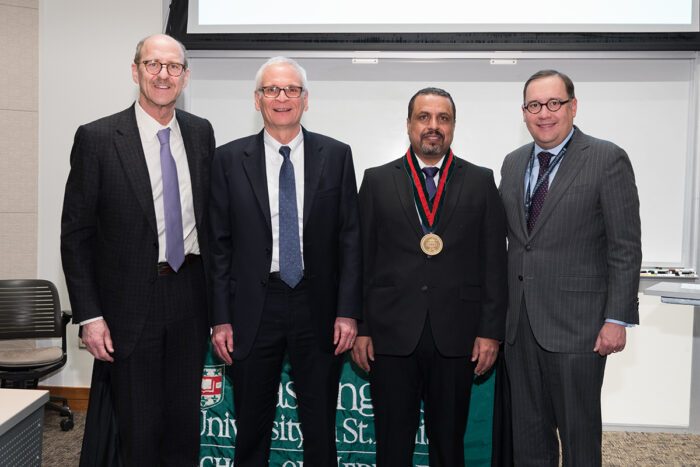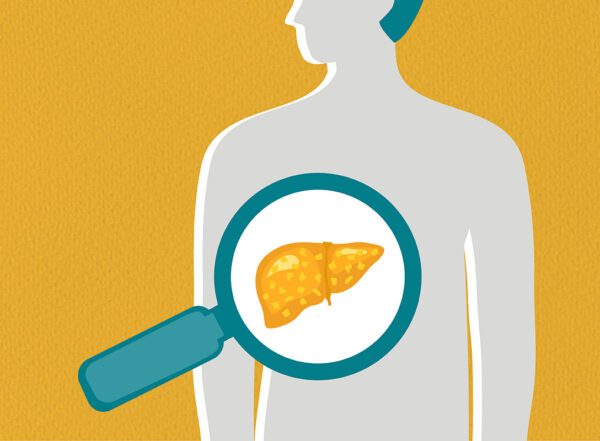Abu-Amer named J. Albert Key Professor
Professorship endows research into causes of inflammation and related skeletal problems
 Mark Beaven
Mark BeavenAt the installation of Yousef Abu-Amer, PhD, as the J. Albert Key Professor are (from left) David H. Perlmutter, MD, executive vice chancellor for medical affairs, the George and Carol Bauer Dean of the School of Medicine and the Spencer T. and Ann W. Olin Distinguished Professor; Regis J. O’Keefe, MD, PhD, the Fred C. Reynolds Professor and head of the Department of Orthopaedic Surgery; Abu-Amer; and Chancellor Andrew D. Martin.
Yousef Abu-Amer, PhD, a leading expert in inflammatory joint disease and bone loss, has been named the inaugural Dr. J. Albert Key Professor at Washington University School of Medicine in St. Louis.
The new professorship was created through the philanthropic legacy of J. Albert Key, MD, who chaired the Division of Orthopaedic Surgery at Washington University from 1930 until his death in 1955. Another Washington University professorship named for Key, the J. Albert Key Distinguished Professorship in Orthopaedic Surgery, is held by spine specialist Keith H. Bridwell, MD.
Abu-Amer was installed by Chancellor Andrew D. Martin and David H. Perlmutter, MD, executive vice chancellor for medical affairs, the George and Carol Bauer Dean of the School of Medicine and the Spencer T. and Ann W. Olin Distinguished Professor.
“Through Dr. Key’s philanthropic legacy and the support of the Department of Orthopaedic Surgery, this professorship allows us to continue to advance research and education in orthopedics while honoring and paying tribute to an esteemed surgeon and leader who also relished his role as a teacher and mentor,” Martin said.
Said Perlmutter: “Dr. Key’s work as a physician-scientist — investigating the roots of arthritis, disorders of the hip joint and deterioration of bone — laid the groundwork for what has become an outstanding orthopedics department at the School of Medicine, making progress in both clinical injury management and research into the causes of bone and joint disorders. I believe he would have been proud to support the very important research Dr. Abu-Amer has advanced in their shared field.”
Estimates indicate more than 60 million Americans suffer from inflammatory joint diseases and that arthritis is the leading cause of disability in the United States. Abu-Amer studies some of the most devastating complications of inflammatory arthritis: joint erosion and excessive bone loss associated with advanced and late stages of the disease. He is interested in deciphering the molecular mechanisms at the interface of inflammation and skeletal tissue to help doctors pinpoint therapeutic interventions.
“Yousef is a leader in the investigation of inflammation and its molecular signatures in immune cells, bone cells and cartilage cells,” said Regis J. O’Keefe, MD, PhD, the Fred C. Reynolds Professor and head of the Department of Orthopaedic Surgery. “He is working to improve our understanding of bone and joint degeneration and to develop better preventive and therapeutic responses. His work is significantly advancing our understanding of the relationship between inflammatory molecular pathways and major events, such as joint failure, that can require extensive surgical interventions.”
Abu-Amer is a fellow of the American Society for Bone and Mineral Research and a former member of the organization’s policy and publication committees. In 2002, he received the Kappa Delta Young Investigator Award from the American Academy of Orthopedic Surgeons. He is a standing member of the National Institutes of Health’s (NIH) Skeletal Biology Structure and Regeneration Study Section and previously was a grant reviewer for NASA, the Department of Veterans Affairs, the Department of Defense and the Arthritis Foundation, and other funding agencies. He has had continuous funding from the NIH since 1999 and from Shriners Hospitals for Children since 2002.
Abu-Amer earned his bachelor’s and master’s degrees and doctorate from the Hebrew University in Jerusalem. He completed his postdoctoral fellowship training in the Department of Pathology & Immunology at Washington University before joining the faculty in 1999. Abu-Amer also is a professor of cell biology & physiology, associate director of the Musculoskeletal Research Center and director of the Animal Models of Joint Injury and Disease Core at the School of Medicine.
Key graduated from the Johns Hopkins University School of Medicine in 1918 and trained in surgery and orthopedics at Boston Children’s Hospital and Massachusetts General Hospital in Boston. In 1926, Washington University recruited him to become director of research at what was previously known as St. Louis Shriners Hospital for Crippled Children. In 1930, he became head of orthopedic surgery, and in 1945, he established the School of Medicine’s orthopedic surgery residency.
Several awards bear his name, including the Mid-America Orthopaedic Association’s J. Albert Key Award for Resident Research and the J. Albert Key Prize for Excellence in Medical Writing. At Washington University, the J. Albert Key Memorial Orthopaedic Library was established in his honor, and in 1989, Asa C. Jones, MD, and his wife, Dorothy, created the J. Albert Key Distinguished Professorship in Orthopaedic Surgery. Asa C. Jones, an orthopedic surgeon and 1942 graduate of the School of Medicine, was mentored by Key.
Key co-authored six editions of the book “Management of Fractures, Dislocations and Sprains,” at one time the definitive text on orthopedic trauma. He also was named president of the American Orthopaedic Association in 1946 and of the Orthopaedic Research Society in 1955.






